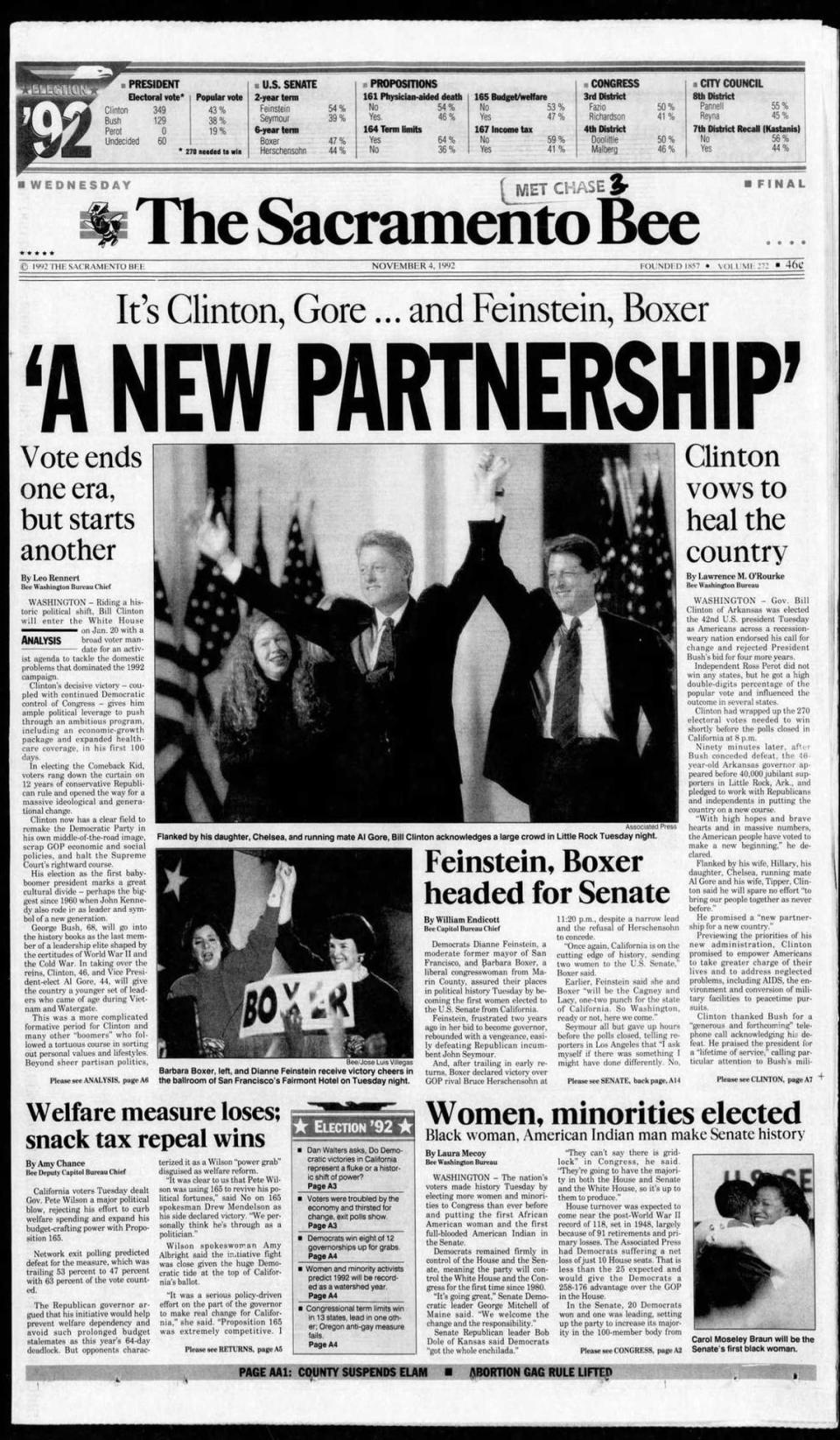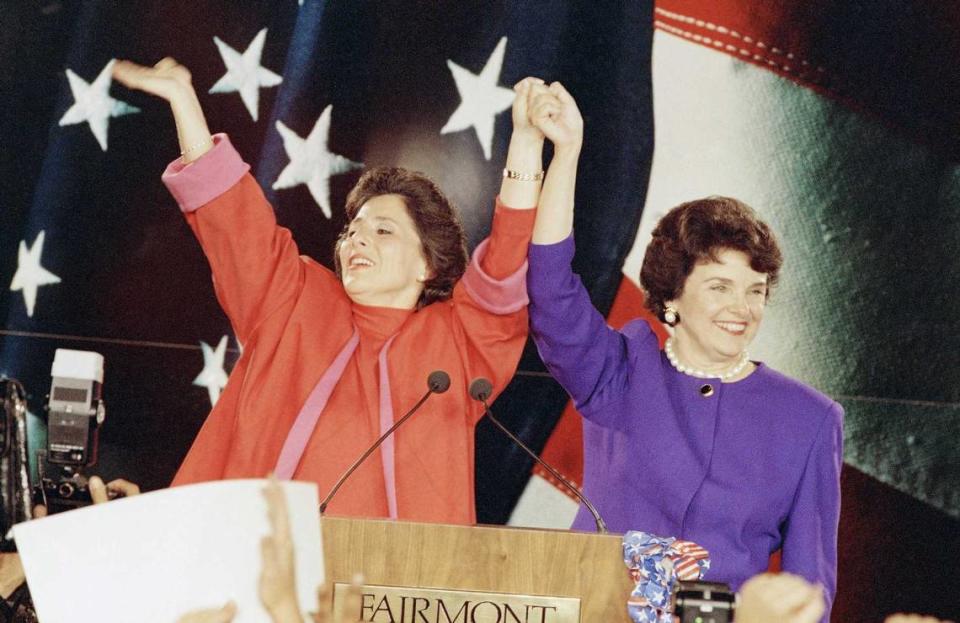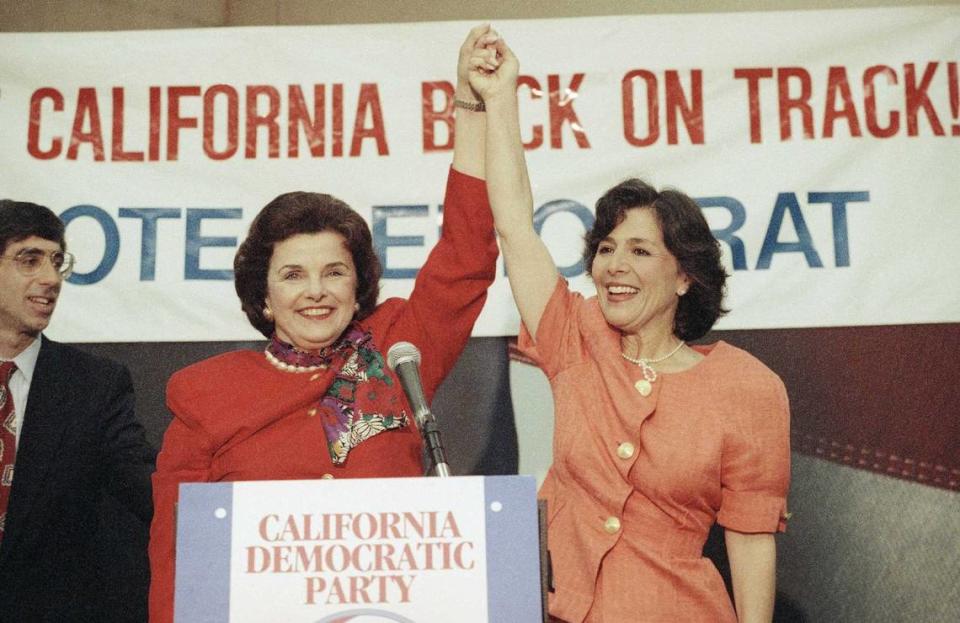From The Bee Archives: In 1992, Dianne Feinstein rides blue wave in first Senate victory
- Oops!Something went wrong.Please try again later.
- Oops!Something went wrong.Please try again later.
This story appeared on the front page of The Sacramento Bee on Wednesday, Nov. 4, 1992, the morning after Dianne Feinstein was elected, alongside Barbara Boxer, to serve in the U.S. Senate. Feinstein, the state’s longest-serving U.S. senator, died Friday at the age of 90.
Democrats Dianne Feinstein, a moderate former mayor of San Francisco, and Barbara Boxer, a liberal congresswoman from Marin County, assured their places in political history Tuesday by becoming the first women elected to the U.S. Senate from California.
Feinstein, frustrated two years ago in her bid to become governor, rebounded with a vengeance, easily defeating Republican incumbent John Seymour.
And, after trailing in early returns, Boxer declared victory over GOP rival Bruce Herschensohn at 11:20 p.m., despite a narrow lead and the refusal of Herschensohn to concede.

“Once again, California is on the cutting edge of history, sending two women to the U.S. Senate,” Boxer said.
Earlier, Feinstein said she and Boxer “will be the Cagney and Lacy, one-two punch for the state of California. So Washington, ready or not, here we come.”
Seymour all but gave up hours before the polls closed, telling reporters in Los Angeles that “I ask myself if there was something I might have done differently. No, there isn’t.”
Seymour said he had a life before politics “and my wife, Judy, assures me I’ll have a life after politics. There’s always something to do. I think I might like to teach, do some writing. There are a lot of things in life that are out there.”
Boxer had a much tougher race against Herschensohn, a former Los Angeles television commentator who came from far behind to move into a virtual dead heat with her in the last week of their campaign.
With nearly 70 percent of the vote counted, Feinstein was leading Seymour 54 percent to 39 percent, and Boxer led Herschensohn, 47 percent to 44 percent.
Told early in the evening that he had been projected by the networks as a loser, Herschensohn said, “If I should lose this, it’s because of me, nothing else. I sure would like to win this. . . . Let me wait a little longer.”
An estimated 78 percent of the state’s 15 million registered voters went to the polls, reversing a 28-year trend of decline.

Feinstein and Boxer were together at the Fairmont Hotel in San Francisco to await the results, while Seymour and Herschensohn gathered with other Republicans at the Century Plaza Hotel in Los Angeles.
The unprecedented nature of dual Senate elections in California was triggered by the 1990 election of Pete Wilson as governor, after he had served only two years of his second Senate term.
When he took office in January 1991, he appointed Seymour as his successor in the Senate.
But state law requires an appointee to run in the next statewide election. Thus Feinstein and Seymour were battling to serve the remaining two years of the Wilson term.
The Boxer-Herschensohn race was for the regular six-year seat now held by Democrat Alan Cranston, who is retiring.
Much was made of the Feinstein and Boxer candidacies as symbolizing the year of the woman in national politics, when gender alone would be enough to propel them to victory.

In the final analysis, however, Feinstein’s gender advantage was complemented by her mastery of the political process and the statewide name recognition she gained in her unsuccessful run for governor two years ago.
She also benefited from having a weak opponent who the polls showed was never able to establish a clear identity with voters.
The last pre-election Field Poll showed Feinstein’s lead over Seymour solid among both men and women.
And, while a gender gap was more apparent in the Boxer-Herschensohn contest, it was offset by voter antipathy toward incumbent members of Congress, regardless of sex, which Herschensohn exploited to full advantage in his TV advertising.
Boxer at one time held a 22-point lead over Herschensohn but began to slide in early October after he launched a first-strike ad campaign focusing on congressional perks and her record of writing bad checks on the now-closed House bank.
By Friday, the race was a virtual dead heat.
Both races were driven largely by negative TV commercials, but the nastiest turn was taken during the weekend when a top state Democratic Party official disrupted a Herschensohn rally to level sex charges against the Republican candidate.
Political director Bob Mulholland accused Herschensohn of hypocrisy for espousing “traditional values” while patronizing Hollywood strip joints and newsstands selling adult magazines.
Mulholland was immediately suspended without pay by the state Democratic chairman, Phil Angelides, and Boxer disavowed any connection with the incident.
Herschensohn, a bachelor, did not deny Mulholland’s allegations but angrily denounced them as “trash,” “slime” and “selective spying,” and he said he believed Boxer was behind them.
While Feinstein and Seymour were viewed as representing the moderate middle of their two parties, the liberal Boxer and the conservative Herschensohn offered a stark choice between political opposites.
On issues ranging from abortion to national defense to the environment, they were of decidedly different minds.
As Election Day neared and it became obvious Boxer was in trouble, she started campaigning in tandem with Feinstein in hopes the former San Francisco mayor could help her regain momentum.
Seymour became increasingly dispirited as his campaign wore on and he failed to make gains. On Sunday, just two days before the vote, he made no public appearances and seemed to have reconciled himself to defeat.
Asked in Rancho Cucamonga on election eve if Republicans like him would be in better shape in California had President Bush devoted more time to the state, Seymour replied, “You can “if’ it and “if’ it, but the truth is you’re dealt a hand of cards and you play the cards you are dealt.”

